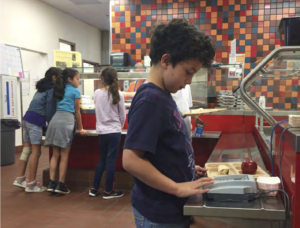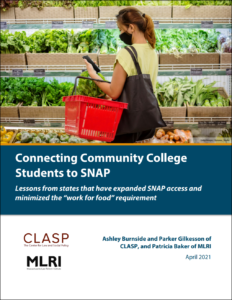In 2020 and 2021, the Massachusetts Law Reform Institute Helped Thousands of Low-Income Families and Individuals across the Commonwealth
Working with Massachusetts Legislators Has Eased Food Insecurity, Kept People Housed, Moved Children Out of Deep Poverty
Boston, Mass. (December 21, 2021) – Through legal, policy, and legislative advocacy, the Massachusetts Law Reform Institute (MLRI) helped thousands of families and individuals living in poverty throughout 2020 and 2021. MLRI is a nonprofit poverty law and policy center that advocates to advance policies and practices that secure economic, racial, and social justice for low-income communities.
“No period in recent memory has placed as much stress on people living in poverty than the last 18 months,” said Georgia Katsoulomitis, MLRI’s executive director. “MLRI has spent more than five decades fighting on their behalf at both the state and national levels. We have an expansive network of advocacy partners and community organizations we collaborate with to advance high impact initiatives. This strong foundation allowed us to move quickly to work with Massachusetts legislators and with the Baker-Polito administration to help the Commonwealth’s most vulnerable when the COVID-19 pandemic hit. Those efforts have had considerable impact on the lives of thousands of Massachusetts residents throughout 2020 and 2021.”
House HWM Legislation a Good Start but Legislature Should Address Opportunities

On Monday, October 25, the Commonwealth’s House Ways and Means (HWM) Committee released a bill that details how the state will spend the billions of dollars that Massachusetts received through the American Rescue Plan Act (ARPA). In total, the Commonwealth received $8.7 billion from the federal government, with $5.3 billion allocated to the state and $3.4 billion designated for municipalities.
Unfortunately, some key priorities that will help the most vulnerable of the state’s residents — those who this funding is supposed to help — were left out of the HWM bill. The bill includes no support for Right to Counsel, despite the fact that the COVID Eviction Legal Help Program (CELHP) has been successful in preventing evictions. There is also no increase in grants for children living in deep poverty.
President Biden and Congress made their priorities clear when they passed ARPA this past spring. These funds are meant to help the most vulnerable, the people struggling to put food on the table, keep a roof over their heads, and have access to health care. This current iteration of the bill is a good start, but does not go far enough in meeting those goals and investing in the Commonwealth’s human capital.
MLRI Celebrates Signing of Meal Debt Legislation
Governor Baker Signs Law that Will Ensure More Children Have Access to Free Lunches at School and Curtail Practice of Shaming Children with Meal Debt
Boston, Mass. (October 14, 2021) – The Massachusetts Law Reform Institute (MLRI) is celebrating the enactment of new legislation that addresses the challenge that children and families living in poverty face when it comes to unpaid school meal debt. Governor Charlie Baker signed today the new law called An Act Promoting Student Nutrition, which was championed by State Senator Cynthia Stone Creem and State Representative Andy Vargas.
“We are grateful to Governor Baker and the Massachusetts legislature for taking seriously the need to change the meal debt practices in the Commonwealth of Massachusetts,” said Georgia Katsoulomitis, MLRI’s executive director. “No child should be made to feel uncomfortable at school because their family is unable to afford a school lunch. This new law will ensure that more children have access to free lunches at school and will put limits on how meal debt is collected.”
Massachusetts Senate Passes Meal Debt Legislation
 Today, the Massachusetts Senate passed H. 3999, An Act to Promote School Nutrition, which will address the challenge that children and families living in poverty face when it comes to unpaid school meal debt. You can learn more about this legislation on the MLRI blog or in Commonwealth Magazine.
Today, the Massachusetts Senate passed H. 3999, An Act to Promote School Nutrition, which will address the challenge that children and families living in poverty face when it comes to unpaid school meal debt. You can learn more about this legislation on the MLRI blog or in Commonwealth Magazine.
“We are very pleased that the Massachusetts House and Senate unanimously passed this important Legislation. Children should never be caught in the middle of school meal debt, denied hot meals or prevented from participating in extracurricular activities or graduation due to unpaid meal debt,” said Patricia Baker, the Massachusetts Law Reform Institute’s food security expert.
MLRI Applauds Passage of Meal Debt Legislation in the Massachusetts House of Representatives
 Last week, the Massachusetts House of Representatives passed An Act Promoting School Nutrition (H.3999), which will address the challenge that children and families living in poverty face when it comes to unpaid school meal debt. That legislation, championed in the House by State Reps. Andres X. Vargas of Haverhill and Sean Garballey of Arlington, will both ensure that more students have access to free school meals and prevent school business practices that effectively punish or embarrass students when their families incur meal debt. The Senate is pending action on a similar bill filed by Senate Majority Leader Cynthia Stone Creem, S. 298.
Last week, the Massachusetts House of Representatives passed An Act Promoting School Nutrition (H.3999), which will address the challenge that children and families living in poverty face when it comes to unpaid school meal debt. That legislation, championed in the House by State Reps. Andres X. Vargas of Haverhill and Sean Garballey of Arlington, will both ensure that more students have access to free school meals and prevent school business practices that effectively punish or embarrass students when their families incur meal debt. The Senate is pending action on a similar bill filed by Senate Majority Leader Cynthia Stone Creem, S. 298.
Patricia Baker, MLRI’s food security expert, noted:
“This legislation represents a major step by the Massachusetts House of Representatives toward boosting federal nutrition dollars for local schools and reducing the burden of school meal debt on families with children. In addition to requiring more schools with high numbers of low-income students to provide universal free meals, this legislation prevents schools from involving or punishing students for meal debt. As we work toward universal school meals for all, we deeply appreciate Speaker Mariano and House leadership in passing Rep Vargas’ bill.”
In 2018, the Massachusetts Law Reform Institute issued a report that looked at unpaid school meal policies in 154 Massachusetts school districts and how they can become punitive towards children in low-income households. We also looked at how some other states across the nation were addressing this practice, a summary of which you can find in this opinion piece at WBUR.
New Report Recommends Pathways to Reduce Food Insecurity Among Community College Students
 Food insecurity is on the rise throughout the country, including for low-income college students struggling to complete their education. COVID has further exacerbated the crisis for students. In a national survey conducted in the fall of 2020, roughly three in five college students reported they are experiencing basic needs insecurity during the public health crisis.
Food insecurity is on the rise throughout the country, including for low-income college students struggling to complete their education. COVID has further exacerbated the crisis for students. In a national survey conducted in the fall of 2020, roughly three in five college students reported they are experiencing basic needs insecurity during the public health crisis.
College students have been left with unique and complicated challenges as a result of the pandemic. At the colleges that previously offered campus-based food pantries, donated “meal swipes” from paid meal plans, or subsidized cafeteria meals, remote learning has caused these options to mostly disappear — and for many students, even these gestures were not enough. Community college students — a group often including more first-generation college students from families with low income — have been especially impacted without the campus and community networks that provided them with resources prior to the public health crisis.
Yet policy barriers in the Supplemental Nutrition Assistance Program (SNAP), including student work requirements known as “work for food” rules, perpetuate this threat to student learning, health, and stability.
Although Congress authorized states to implement temporary measures to provide federal nutrition benefits or SNAP to more college students during the pandemic, these measures will likely expire by end of this calendar year. But Massachusetts has demonstrated a solution that other states could emulate to more permanently expand access to SNAP benefits for low-income community college students.
